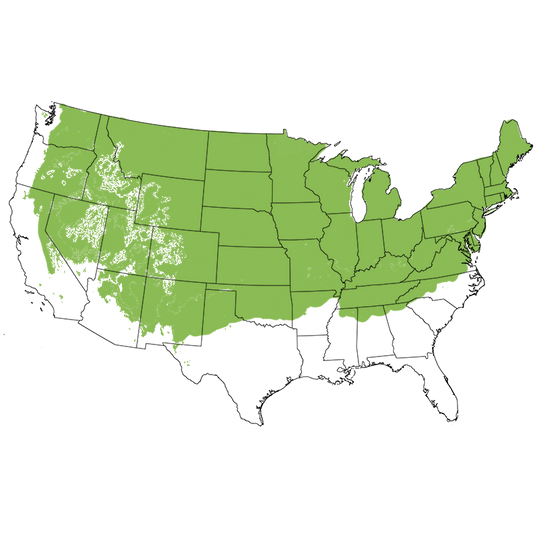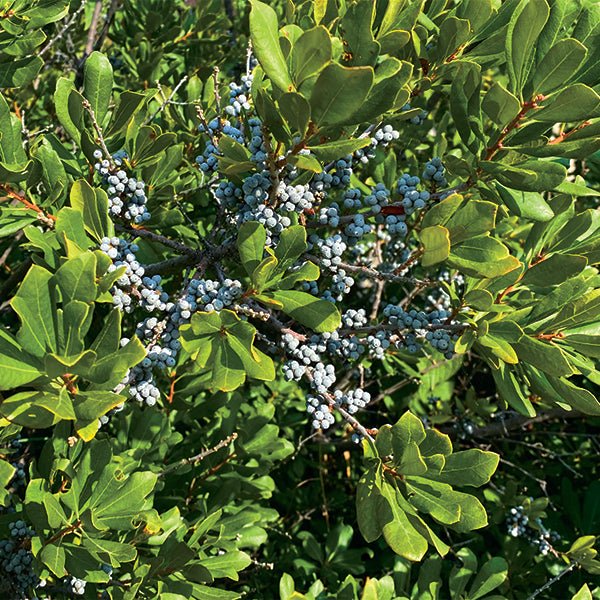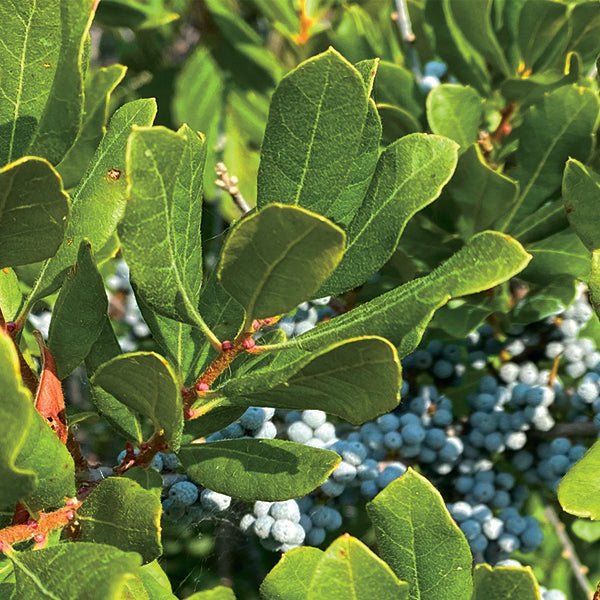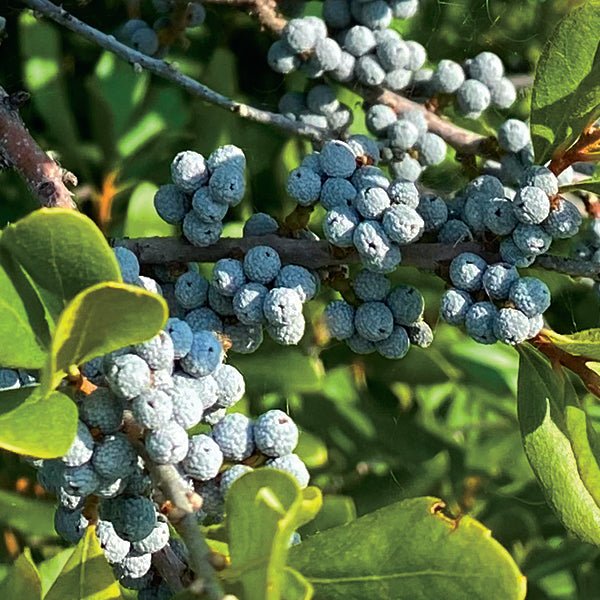Northern Bayberry
Myrica pensylvanica
Planting & Care
Planting & Care
Delivery and Shipping
Delivery and Shipping
Preorder Shipping Schedule
We ship your plants when it's safe to transport them to your zone. Dates are estimated and subject to weather delays.
| Zone 3-4 | Week of March 30th |
| Zone 5 | Week of March 16th |
| Zone 6-12 | Week of March 2nd |
Shipping Rates
Ships in 3-4 business days • Tracking provided • Weather protected
| Under $50 | $9.99 |
| $50 - $99.99 | $14.99 |
| $100 - $149.99 | $16.99 |
| $150 - $198.99 | $24.99 |
| $199+ | FREE |
✓ Zone-specific timing • ✓ Professional packaging • ✓ Health guarantee

Plant Sentry™ Protected
Your order is protected by our compliance system that:
- Prevents restricted plants from shipping to your state
- Ensures plants meet your state's agricultural requirements
- Protects gardens from invasive pests and diseases
Bird-Friendly Fragrant Native Shrub Northern Bayberry
- Dark Green, Aromatic Foliage is Densely Held
- Showy Clusters of White Berries Have Waxy Coating
- Traditionally Used in Bayberry Candles
- Attracts Butterflies and Birds, but Not Deer
- Native to North America
- Versatile
- Semi-Evergreen in Warmer Zones
- Tolerates Coastal and Road Salt
- Tolerates Urban Pollution
- Related to Southern Wax Myrtle
One of our most valuable native shrubs, Northern Bayberry (Myrica pensylvanica) should be considered for ornamental landscape use across a variety of growing zones and growing conditions. Songbirds, game birds, butterflies, and moths will appreciate your thoughtful choice.
Bayberries are hard-working, aromatic shrubs that deliver a lot of benefits for wildlife. With dense branching and a rounded upright growth habit, this is a fine choice for naturalizing. You'll appreciate the fragrance and the privacy screen!
This plant remains semi-evergreen in warmer climates, but becomes deciduous the further north you go. It is a rugged selection that fixes nitrogen in the soil to improve the fertility of your land over time.
Leathery leaves are broad and lance-shaped and emit resin from pores on the underneath side. Deer don't prefer the taste, but you'll love the clean, natural scent of the aromatic foliage.
Bayberry leaves emit a classic fragrance throughout the spring and summer. Try them as a natural insect repellent.
Crush them between your fingers and apply the resin to your ankles, wrists, and neck. You may still get a few bites, but boy, you'll smell terrific!
Bayberry plants are dioecious, with separate male and female plants. Tiny inconspicuous yellow-green flowers on the male plants provide nectar for moths and butterflies in spring. Pollinated female plants produce berries (actually drupes) that provide so much winter interest.
If you want to grow the desirable, fragrant, waxy-coated pale berries, plant in groups so the males can pollinate the female plants that will produce fruit. After all, Bayberry is a dioecious shrub, similar to Holly that has both male and female plants.
The Northern Bayberry berries have long been used as a candle-making ingredient. In fact, you might hear this native called by several nicknames, including Candleberry and Swamp Candleberry.
Colonialists boiled the berries to extract the waxy coating. It takes roughly 4 pounds of berries to produce a single candle the old-fashioned way.
These days, you can simply use large handfuls to add a tremendous natural fragrance to more modern handmade candles, soaps, and in dried potpourri mixes. We are so lucky, aren't we?
Great even for beginning gardeners, this historically important native shrub is extremely tolerant of sandy soil and even high salt content. Try it as a street planting without fear of damage from road salt.
Including Bayberry in your garden scheme ensures a safe harbor for a variety of desirable creatures from birds to butterflies. Order yours today to create attractive wildlife habitats and add fragrance to your landscape.
The expert growers at Nature Hills love these special shrubs. Order your Northern Bayberry today and start your own love affair with them.
How to Use Northern Bayberry in the Landscape
Bayberry creates attractive hedges, mass plantings, and privacy borders, but it may also be successfully integrated as a focal point planting.
Create a Fragrance Garden with Bayberry, Lavender, Lilacs, Fragrant Sumac, fragrant Roses, Fragrant Sweet Box, Mock Orange, and indoor/outdoor Citrus trees in large containers. Add a hammock chair and you'll never forget the sensory experience.
Add a hedge of Bayberry to create "Living Walls" all around a special Meditation Garden or outdoor Yoga Studio. Be invigorated and recharged in your space.
Bird lovers should take a close look at this selection. Migrating birds and gamebirds eat the energy-rich berries over hard winters
Northern Bayberry shrubs also give songbirds and game birds plenty of shelter over the winter. Include several of these low-maintenance shrubs near your bird feeders to provide cover.
Plant responsible landscapes that take advantage of our wonderful native plants. Pair these with native Itea, such as Little Henry Sweetspire, for easy-care landscape hedges. You can also use them on embankments to control soil erosion.
#ProPlantTips for Care
These rugged plants are widely adaptable. They grow in chalky, clay, loamy, sandy, alkaline or acidic soils and even poor soils. They tolerate periodic flooding but are drought-tolerant once they are established.
Bet you are starting to see how durable these shrubs are, aren't you?
Northern Bayberry grows in full sun to partial shade. For best performance, give them at least 4 hours of direct sunlight a day.
For the best silvery berry production, use multiple plants. Plant four feet apart to create a solid screen, or use a double, staggered row and a zigzagging planting pattern.
Enjoy the ornamental features of our native Northern Bayberry plants. Order today!
-
Botanical Name
-
Class
-
Species
-
Growing Zones
-
Height
-
Width
-
Sunlight
-
Growth RateModerate
-
Flower Color
-
Leaf Color
-
NativeYes
-
FragrantYes
-
Bloom PeriodEarly Spring, Late Spring
-
Does Not Ship ToAK, HI, ID, MT, PR







